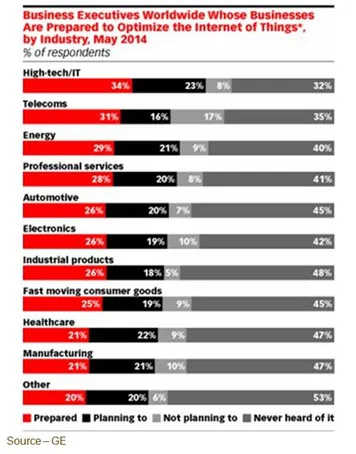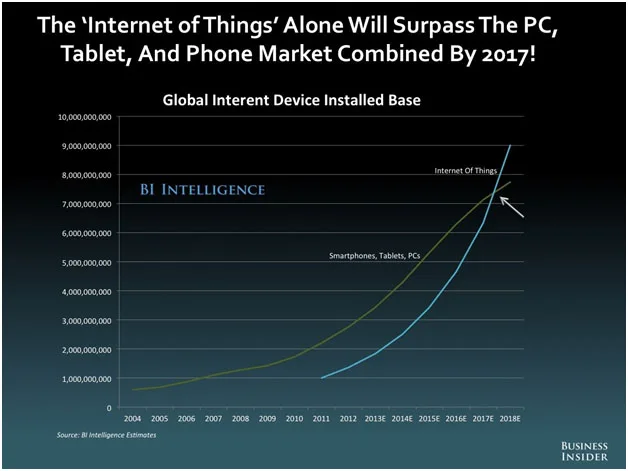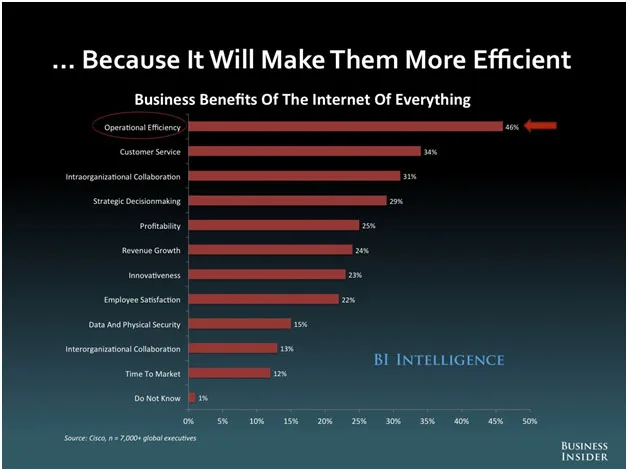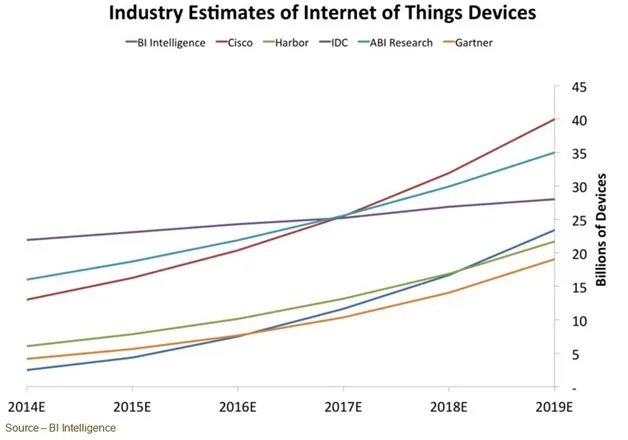IoT Journey – 50B Connected Things Means … 50B Connected Things

The world of IoT (Internet of Things) is so big, has so much potential it will never happen!
Sorry to burst your bubble or let you sigh with relief but … sorry.
How could I be so right and so many really smart people at IDC, ABI, HIS, Gartner, Cisco, Ericsson, Apple, Samsung, HP, Ford, Audi, Google, Facebook, you name it, be so wrong?
After all, depending on whose numbers you believe, it’s going to be a connection of 30-50B things and will rack up about $1.9T in sales.
Its very definition dooms IoT — The Internet of Things is the network of physical objects or “things” embedded with electronics, software, sensors and connectivity to enable it to achieve greater value and service by exchanging data with the manufacturer, operator and/or other connected devices.
That’s so big, you can’t even get your head around it.
That’s so big, if you had it, would you share it with the competition? The government? Their governments?
 It’s Irresistible – With all of wild through-the-roof market potential being thrown about, it’s easy to get blinded by the potential and run like crazy to capture your unfair share of a market that is going to go through the roof–even when you don’t really understand what the market is or what it means.
It’s Irresistible – With all of wild through-the-roof market potential being thrown about, it’s easy to get blinded by the potential and run like crazy to capture your unfair share of a market that is going to go through the roof–even when you don’t really understand what the market is or what it means.
And you think Ford will share with Toyota? MS with Google? HBO with Netflix? Ford with Apple? Met Life with Farmers? SanDisk with Micron? Cisco with Huawei? Ericsson with Akami?
Yeah, right!
The move, the potential is too great not to continue to grow; but it will be Internets (plural) of things; not one utopian sharing stuff with everyone else that analysts and Cisco’s Chambers envision.
Sooner or later, greed kicks in and BAM!, I’ve got mine, you get yours.
Businesses are only looking at IoT from their perspective.
 Not One Market – IoT isn’t one market; it’s multiple markets–each with different requirements, products, implementation and timing. Some IoT market segments will move quickly and easily, while others will grow slowly and carefully. One size doesn’t fit the product category market.
Not One Market – IoT isn’t one market; it’s multiple markets–each with different requirements, products, implementation and timing. Some IoT market segments will move quickly and easily, while others will grow slowly and carefully. One size doesn’t fit the product category market.
Folks in the technology industry are moving rapidly to optimize IoT for their individual benefits (ROI).
Every other sector is working on some type of IoT initiative that will benefit … them.
Rather than using an open API (application program interface), they’re using one that delivers maximum benefits for them while limiting/locking out competitors and hackers/cyberthieves.
It isn’t that difficult. All they need is a plan, the right tools, good enough technology knowledge, plus a budget (time and money) and they can be connected to the Internet and lay claim to their part of the IoT.
When you have a hammer, everything looks like a nail. When you have a market that you’re trying to protect/expand and gather competitive/customer information along the way, IoT looks exactly like what you’re building/delivering.
Slapping a Bluetooth or Wi-Fi chip on a refrigerator, toaster, car, garbage can, shipping container, toothbrush, scale, heart monitor (O.K., maybe a heart monitor) isn’t rocket science; but it’s not about the devices.
 Global Potential – Devices and sensors of all types will be connected to the Internet and will enable organizations to gather vast amounts of information and data to improve customer and partner assistance and support. In fact, there will be more connected items than there are people on the planet.
Global Potential – Devices and sensors of all types will be connected to the Internet and will enable organizations to gather vast amounts of information and data to improve customer and partner assistance and support. In fact, there will be more connected items than there are people on the planet.
That’s being done with scary regularity because right now, business- and personal IoT-enabled products have infrastructure issues:
- 90 percent of the devices collect at least one piece of personal info via the device, cloud, mobile app
- 6 out of 10 devices have user interfaces that are vulnerable to “issues”
- 80 percent don’t require robust passwords
- 70 percent let attackers identify user accounts
- 70 percent use unencrypted network services
Businesses are rapidly implementing IoT because the benefits can be quickly seen.
Adding data collection sensors on factory production equipment, office buildings and warehouse shelves can reduce manufacturing and customer services costs, improve organizational collaboration, enhance decision making, enhance growth and improve profits.
BI Intelligence found:
- Manufacturers will invest $140B over the next five years to make themselves more competitive
- 18 percent of industrial machinery firms will use IoT to increase production, reduce costs
- 17 percent of auto firms will use IoT to streamline the parts supply pipeline
- Transportation/warehousing will invest to reduce warehousing and shipping costs
- iNet infrastructure firms will invest to improve their data and data analysis needs
 Clear Business Potential – Just as automation changed the way organizations and people worked, implementing IoT can provide a ROI (return on investment) that is easy to see and measure. This will lead to rapid implementation in a wide range of markets.
Clear Business Potential – Just as automation changed the way organizations and people worked, implementing IoT can provide a ROI (return on investment) that is easy to see and measure. This will lead to rapid implementation in a wide range of markets.
It’s kinda’ scary that we will have all of these companies connecting what is projected to be a total of 50 billion devices to some type of network.
Most analysts agree that a third of them will be computers, smartphones, tablets and TVs. The remaining two-thirds (roughly five for every man, woman, child on the planet) will be things – sensors, actuators and intelligent devices.
Unlike any previous transformative shift (production lines, automation, computers, the Internet, mobile technology), IoT impacts and draws from what has come before and adds new business opportunities, challenges and interactivity as well as cross-pollination of organizations and activities in diverse areas with diverse objectives.
It will be much like the launch and evolution of the Internet itself where no single entity will manage, control it all.
Instead, firms will have to determine the area where IoT aligns with their business charter and area(s) of expertise:
- enablers that can develop, implement the underlying technology
- engagers that can design, create, integrate, deliver IoT services to customers
- enhancers that can develop value-added services unique to their segment of the IoT
Analysts at Booz & Company project that one in six companies will introduce some sort of IoT product, while three-quarters of the firms will first implement IoT technology/solutions to improve their operations and services.
 IoT Forecasts – Depending on how market research firms define the IoT, the forecasts can vary significantly. Regardless of the forecast, it’s easy to see that the growth (and profit) potential will be significant. The key for firms is to clearly identify their market/application objectives and then aggressively pursue their marketing objectives.
IoT Forecasts – Depending on how market research firms define the IoT, the forecasts can vary significantly. Regardless of the forecast, it’s easy to see that the growth (and profit) potential will be significant. The key for firms is to clearly identify their market/application objectives and then aggressively pursue their marketing objectives.
The potential is enormous. Analysts project the economic impact by 2020 will range from $2 – $14T.
That’s serious money that will reflect well on the bottom line.
 But the focus that will win in the mad rush to IoT will be the one that centers on getting to know the customer and providing services that satisfy their wants and needs.
But the focus that will win in the mad rush to IoT will be the one that centers on getting to know the customer and providing services that satisfy their wants and needs.
We’ve never seen something this complex, so far reaching, so flat out new!
We’re still in the early-adopter phase but management has to come to grips with the brutal fact that they can’t control the world of IoT.
They have to figure out what role they’re going to play, the capabilities they’re going to need and the types of innovations they want to focus on.
If your company wants to stake a claim with the Internet of Things, you first need to develop a distinctive “way to play”—a clear value proposition that you can offer customers. This should be consistent with your enterprise’s overall capabilities: the things you do best when you go to market, aligned with most or all of the products and services you sell.
# # #